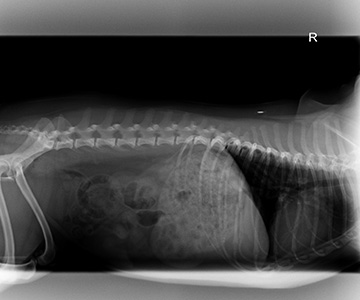An annual physical examination of your pet, often done accompanied by your pets annual vaccinations, allows us to discover and review any abnormalities and provide appropriate recommendations to avoid more serious complications later on. It is also provides an opportunity for you to discuss any concerns you have about your pet.
Keeping your pet up to date on required vaccinations is an important step in maintaining health long term. Depending on your pet's age and lifestyle, the recommendations for vaccinations used and the frequency of their administration will vary. We will gladly discuss with you the vaccination schedule that is most appropriate for your pet.


Our surgical suite is equipped to allow us to perform routine surgical procedures.
Currently we are advising pre surgical blood tests to ensure your pet is healthy enough for the stress of a routine surgery, and for invasive procedures, it is now commonly recommended that your pet receive intravenous fluid therapy during the surgical procedure. One of our doctors would be glad to discuss these procedures with you prior to your appointment.
Most procedures will be performed with your pet under general anesthesia. In general, your pet will be given a pre anesthetic sedative mixture, followed by an injectable agent to induce anesthesia and maintained under anesthesia with inhalant anesthetic.
Pain medication will be administered at various points throughout the procedure and for most procedures, will be sent home as well.
In order to diagnose, then monitor many disease processes, we make use of a number of different laboratory tests. Many of these are done here at the hospital.
We make use of Idexx analyzers to get timely results on blood samples. These machines report the cellular make up as well as biochemical parameters in your pet's blood.
We also analyze urine, test for parasites in both blood and feces and perform some cytology (microscopically look at individual cells) evaluations at the clinic.
When we need more specialized tests performed, we will collect the appropriate samples from your pet and forward them to the appropriate laboratory. Most of our "sent out" testing is done through Idexx Laboratories. We have daily pick-up by the laboratory and results are returned over the internet as soon as they are posted at the laboratory.
We use a modern Digital Radiography system.
When necessary, we can digitally send x ray images to a radiologist for consultation regarding your pet's condition.



Microscopic examination of fecal material allows us to identify if your pet has intestinal parasites such as roundworms, hookworms, tapeworms or coccidia. Appropriate treatments for your pet can then be advised.
For our canine friends, we are currently recommending testing for Heartworm and 3 other Tick-borne diseases (Lyme Disease, Anaplasmosa and Ehrlicia infections). Negative test results would allow you to start your pet on a preventative program for Heartworm during the months that mosquitoes are active. Positive results for any of the antigens will allow treatment and further monitoring to be done.
For both our canine and feline friends we will gladly give you advice on the most appropriate options for flea, tick and other parasite control for your pet, depending on his or her age and lifestyle.
We offer microchip identification of your pet. Once registered into a national database, should your pet become lost, your contact information will be linked to the unique code embedded in the microchip you pet carries enabling his or her safe return once identified.

Most pets are fed the same diet day after day after day. This makes it important for that diet to be a healthy one.
Much research has been (and continues to be) done on specialized diets geared to specific disease conditions or animal states. Should one of our doctors feel there is a benefit to your pet to be on a specialized diet, they will discuss that with you.
Feel free to initiate that conversation yourself.
After-Hour Services will be referred to:
Kawartha Veterinary Emergency Clinic
1840 Lansdowne St. W
Unit 1B, Peterborough, ON
K9K 2M9
(705) 741-KVEC (5832)